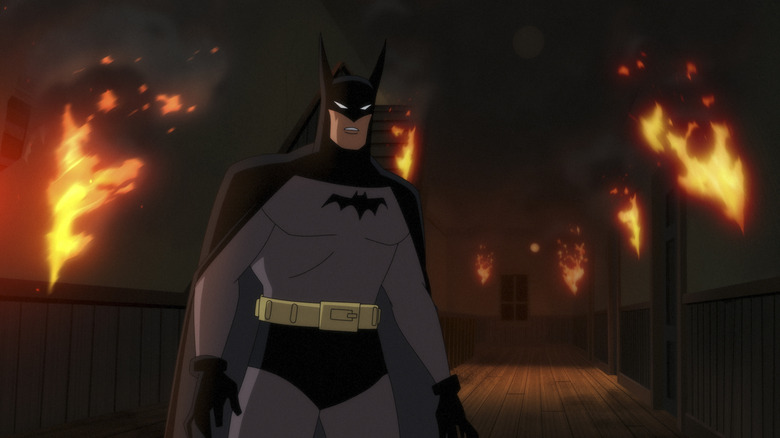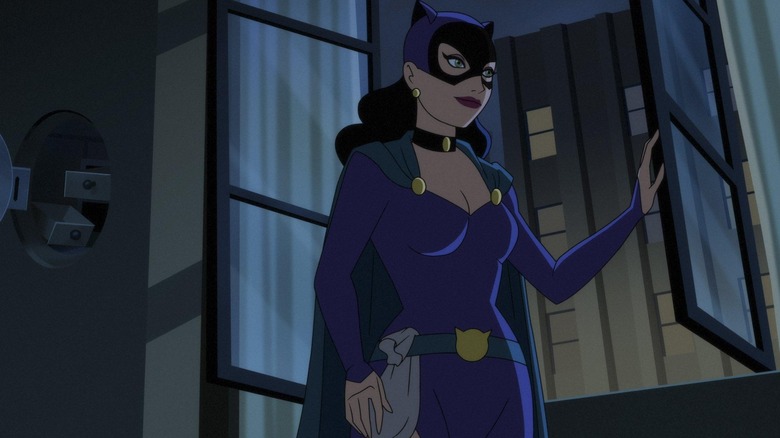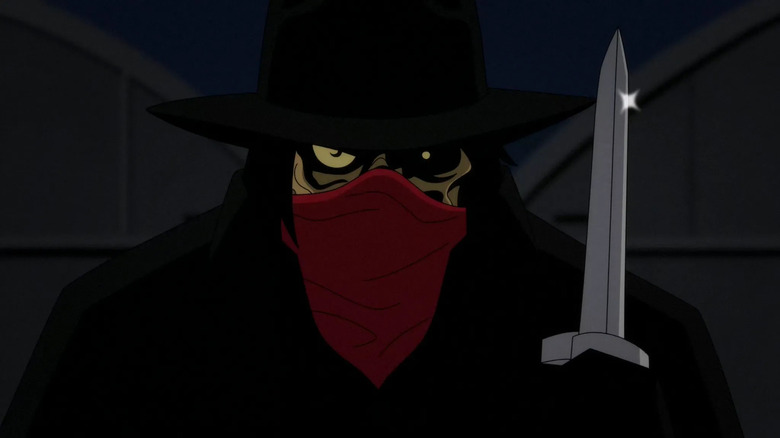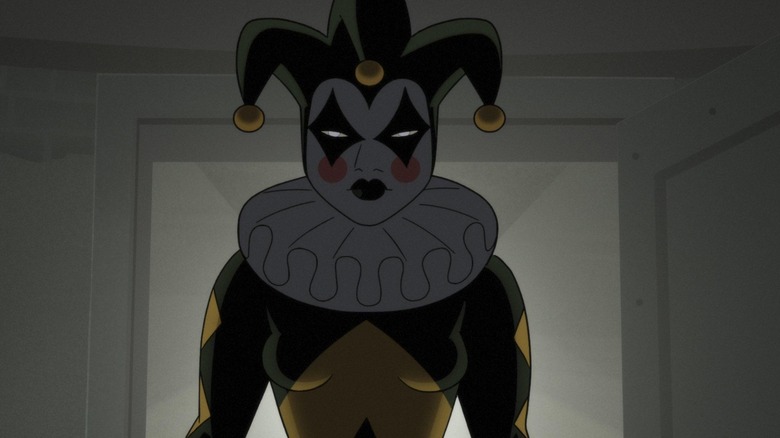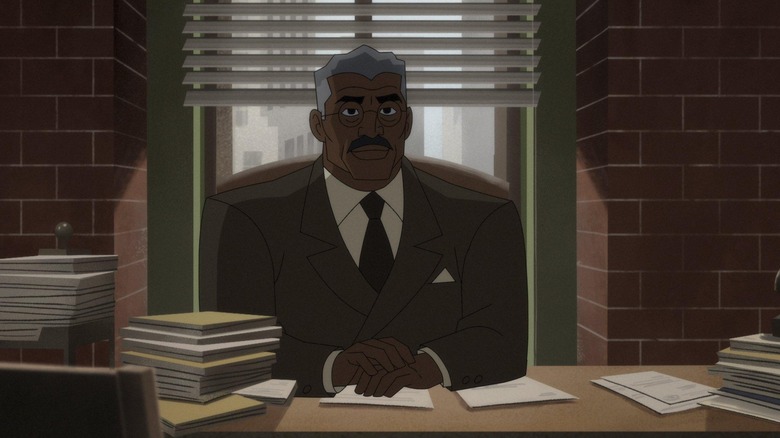Batman: Caped Crusader Review: The Scariest, Best, And Most Mature Batman In Years
I shall only briefly touch on the corporate politics surrounding the release of "Batman: Caped Crusader." The new animated series, overseen by "Batman: The Animated Series" honcho Bruce Timm and pop culture archbishop J.J. Abrams, was handed off to Amazon during David Zaslav's aggravating Warner Bros. fire sale. Zaslav infamously axed many popular shows from HBO Max (now just called "Max"), canceled seemingly shoo-in successes, and even shelved completed movies for tax write-offs. Batman had long been associated with Warner Bros. — the studio has released every piece of Batman media since 1967 — so to hand such a famous character to another studio seemed like a foolish financial decision in the eyes of the world.
At the end of the day, however, those financial decisions are but red tape, a mere roadblock on the way to accessing a great show. And make no mistake, "Caped Crusader" is a great show. It's a thoughtful, adult, intense, sometimes terrifying take on Batman that bends toward the classical. In the wake of the bleak corporate autofellatio that was "Deadpool & Wolverine," "Caped Crusader" is a breath of fresh air in that it's attempting to tell a Batman story with creativity, care, and an eye for character. Instead of being a sweaty "love letter to fans," "Caped Crusader" engages viewers on an emotional level. And its key emotions are fear and guilt.
"Caped Crusader" is not meant to be consumed by fanboys with open notepads and vitriol-soaked Reddit accounts. It's a dark, shadowy hallway to explore. A clear-eyed nightmare of clowns and ghosts. It is free of the adolescent angst of Matt Reeves' "The Batman," and quite a distance from the bloated, wacky corporate hijinks of the DCEU. It's the best piece of Batman media in a decade.
Big Batman shoes to fill
"Caped Crusader" has big shoes to fill, however. In 1992, Bruce Timm oversaw "Batman: The Animated Series," a stylistic continuation of Tim Burton's "Batman" and "Batman Returns" in 1989 and 1991 respectively. That series was broadly stylized, depicting batman as a five-foot-wide linebacker, living in an airbrushed Film Noir world of aching spires. Burton endeavored to make his Batman movies feel timeless, as if they were taking place in the present and in the 1940s simultaneously. Timm took that cue and expanded it into an animated world that was gorgeous to look at. The writing on the series was also sharp and mature, depicting its villains as wounded and complex, each of them touched by madness, obsession, and resentment.
"Animated Series" was beloved by a generation, and that generation, now grown, often holds it up as one of the best shows of all time. One may or may not agree with that generally accepted assessment, but one cannot deny the place Timm's series has in the pop firmament.
"Caped Crusader" expands on the 1992 series in every way, emerging as the superior show. The timelessness of "Animated Series" has now been firmly rooted in the past, with "Caped Crusader" taking place in 1939, when Batman was first introduced on the page. Batman (Hamish Linklater) lives in a run-down Gotham City still stricken by Depression-era poverty; "Caped Crusader," more so than even "The Dark Knight Rises," explores the financial politics of Batman, stressing how much poverty — and the persistently evil spectre of legacy wealth — connect directly into his tussles with villains.
Wealth and villainy in Batman: Caped Crusader
In "Caped Crusader," for instance, Catwoman (Christina Ricci) is a fallen socialite, frustrated that her once-rich lifestyle had to come to an end. This 1939 version of Selina Kyle is a dandyish spoiled brat who turns to costumed cat burglary out of a sporting need to stay rich. The new Clayface (Dan Donohue) is a Lon Chaney-like actor whose odd features never allowed him to breakthrough into the Hollywood mainstream. In a pretty direct metaphor, one episode sees Batman facing off against the Gentleman Ghost (Toby Stephens), a literal phantom connected to land deeds and black magic. Batman has to physically punch intergenerational wealth-hoarding in the face.
Other villains are more grounded. Firebug (Tom Kenney) is a mere pyromaniac arsonist. Onomatopoeia (Reid Scott), wearing an eerie mask, commands a cadre of hat-sporting gangsters. When he fights Batman, he whispers comic book fight noises, a conceit that may be an homage to William Dozier's amazing 1966 "Batman" series. We all know the arc of Harvey Dent (Diedrich Bader), the character destined to become Two-Face. When he "splits" here (and I shan't reveal how), he doesn't so much split between good and evil, as he does between hope and despair. It's a richer, more relatable take on the character.
A po-faced Batman
The "Caped Crusader" version of Batman is po-faced and unhumorous. "I failed," he says in his Batcave. "I can't let that happen again." He refers to Alfred (Jason Watkins) as merely "Pennyworth," and has no affection for the old man. When out on the town as Bruce Wayne, he plays up the "feckless playboy" angle to a degree you know he hates. This Bruce Wayne is a clueless chump, an old-money millionaire who frustratingly survived the Depression without a scratch. He's cheerful and friendly, but it's easy to hate him. When he becomes Batman, he becomes more comfortable, merely in that he's more resolute.
The 1939 setting gives Batman's investigations a palpable, more tactile quality. It's not all computer scanners and GPS. Batman has to go to the scene of the crime and skulk around looking for clues. When Batman gets too high-tech, he loses the haunted house quality that should always hang around the character. He's a bat man, after all. He should always be a little spooky. When Batman is in a cemetery, he looks like he's at home. I'm beginning to understand why a Goth like Tim Burton liked the character.
The humans of Batman: Caped Crusader
Batman is balanced by a strong supporting cast of ordinary human characters. Renee Montoya (Michelle C. Bonilla) is the one honest cop in town. Barbara Gordon (Krystal Joy Brown) is an attorney, fighting a corrupt police force. Her father, the Commissioner (Eric Morgan Stuart), seems tired and teeters on being resigned to Gotham's rampant crime. Voice actors John DiMaggio and Gary Anthony Williams represent the corrupt cops throughout Gotham, happy to commit violence and to bend the rules for their own benefit.
The 25-minute runtime of "Caped Crusader" forces the showrunners to be succinct. The storytelling is tight and efficient. The characters go through arcs at a natural pace, and aren't forced to slow down for turgid action sequences or artificially prolonged stretched of brooding.
There is an underlying sadness to "Caped Crusader" that makes it feel more adult than even something like "The Batman." When a Batman film or TV show is focused on "cool" or on adolescent self-pity (as in the DECU, or in "The Batman"), the character becomes less interesting. When it skews childish (as in 1966) or complex (as in 2024), however, the character excels.
In the year of our Lord 2024, superhero media has bloated and toppled over several times. Vast interconnected cinematic universes have long ago supplanted character and story, and one could be forgiven for bowing out of the genre altogether. "Caped Crusader," however, is a creative new take on Batman that reminds us why we are fundamentally drawn to hero characters in the first place. Sometimes, through sadness and anger, we need to face unbeatable corruption. This is an amazing show.
/Film Rating 9.5 out of 10
All episodes of "Batman: Caped Crusader" premiere on Prime Video on August 1, 2024.
